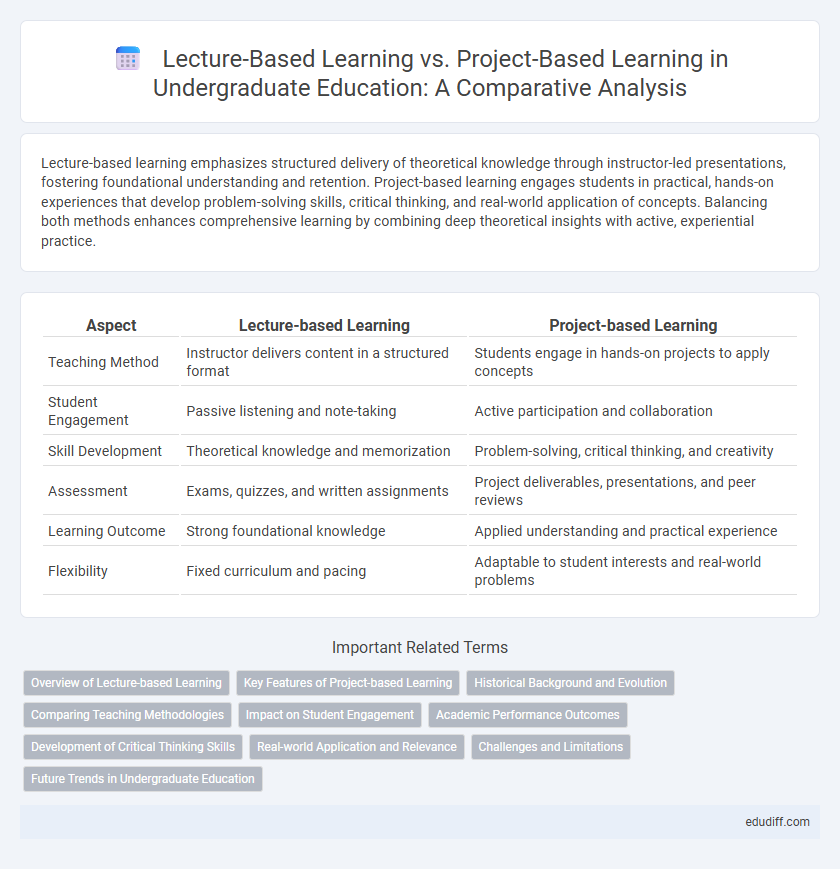Lecture-based learning emphasizes structured delivery of theoretical knowledge through instructor-led presentations, fostering foundational understanding and retention. Project-based learning engages students in practical, hands-on experiences that develop problem-solving skills, critical thinking, and real-world application of concepts. Balancing both methods enhances comprehensive learning by combining deep theoretical insights with active, experiential practice.
Table of Comparison
| Aspect | Lecture-based Learning | Project-based Learning |
|---|---|---|
| Teaching Method | Instructor delivers content in a structured format | Students engage in hands-on projects to apply concepts |
| Student Engagement | Passive listening and note-taking | Active participation and collaboration |
| Skill Development | Theoretical knowledge and memorization | Problem-solving, critical thinking, and creativity |
| Assessment | Exams, quizzes, and written assignments | Project deliverables, presentations, and peer reviews |
| Learning Outcome | Strong foundational knowledge | Applied understanding and practical experience |
| Flexibility | Fixed curriculum and pacing | Adaptable to student interests and real-world problems |
Overview of Lecture-based Learning
Lecture-based learning emphasizes direct instruction where educators deliver structured content to students in a classroom setting, facilitating foundational knowledge acquisition. It relies on verbal explanations, visual aids, and note-taking, promoting efficient coverage of theoretical concepts essential in undergraduate studies. This traditional approach supports large groups, enabling consistent curriculum delivery but may limit hands-on engagement and critical thinking development compared to project-based methods.
Key Features of Project-based Learning
Project-based learning emphasizes hands-on, real-world problem solving by engaging students in extended projects that foster collaboration, critical thinking, and creativity. This approach prioritizes active learning through exploration, allowing students to apply theoretical knowledge to practical challenges and develop deeper understanding. Assessment in project-based learning is often formative, focusing on the process, presentation, and reflection rather than traditional exams.
Historical Background and Evolution
Lecture-based learning, rooted in ancient Greek and Roman traditions, has long served as the dominant method for undergraduate education, emphasizing direct knowledge transmission from instructor to student. Project-based learning emerged more prominently in the 20th century, influenced by educational reformers like John Dewey who advocated for experiential and student-centered approaches to foster critical thinking and real-world problem-solving skills. This evolution reflects a broader shift in pedagogical strategies aimed at enhancing engagement and practical application in undergraduate curricula.
Comparing Teaching Methodologies
Lecture-based learning emphasizes structured content delivery through instructor-led presentations, promoting foundational knowledge acquisition and efficient coverage of theoretical concepts. Project-based learning centers on experiential education, where students engage in real-world problem-solving tasks that enhance critical thinking, collaboration, and practical application of skills. Comparing these methodologies reveals lecture-based learning excels in standardized knowledge dissemination, whereas project-based learning fosters deeper understanding and retention through active participation.
Impact on Student Engagement
Lecture-based learning often results in passive student participation, limiting opportunities for active engagement and critical thinking. Project-based learning fosters deeper involvement by encouraging students to apply concepts through hands-on tasks, promoting collaboration and problem-solving skills. Studies indicate that project-based approaches significantly increase motivation, retention, and overall academic performance among undergraduate students.
Academic Performance Outcomes
Lecture-based learning primarily enhances theoretical knowledge acquisition and provides structured content delivery, supporting strong foundational understanding for undergraduate students. Project-based learning fosters critical thinking, problem-solving skills, and application of concepts, leading to improved retention and higher-order cognitive abilities. Studies indicate that combining both methods can optimize academic performance outcomes by balancing knowledge mastery with practical experience.
Development of Critical Thinking Skills
Lecture-based learning primarily delivers structured content that builds foundational knowledge, yet may limit opportunities for active problem-solving. Project-based learning engages undergraduate students in real-world challenges, fostering critical thinking through hands-on analysis, synthesis, and evaluation of complex information. Empirical studies indicate project-based methods significantly enhance critical thinking skills compared to traditional lectures.
Real-world Application and Relevance
Lecture-based learning primarily delivers foundational theories and principles through structured presentations, offering limited direct real-world application. Project-based learning emphasizes hands-on experiences, fostering practical skills by engaging students in real-world challenges and collaborative problem-solving. This approach enhances relevance by connecting academic concepts to tangible outcomes, better preparing undergraduates for professional environments.
Challenges and Limitations
Lecture-based learning often faces challenges such as limited student engagement, passive information absorption, and difficulty in catering to diverse learning styles. Project-based learning, while promoting active involvement and critical thinking, may encounter limitations including resource constraints, uneven participant collaboration, and time management issues. Both methods require strategic adjustments to address these challenges effectively in undergraduate education.
Future Trends in Undergraduate Education
Lecture-based learning continues to evolve with the integration of immersive technologies like virtual reality, enhancing conceptual understanding through interactive simulations. Project-based learning gains prominence as it fosters critical thinking, collaboration, and real-world problem-solving skills essential for future job markets. Hybrid models combining lectures and projects are emerging to provide a balanced, experiential education that caters to diverse learning preferences in undergraduate programs.
Lecture-based Learning vs Project-based Learning Infographic

 edudiff.com
edudiff.com